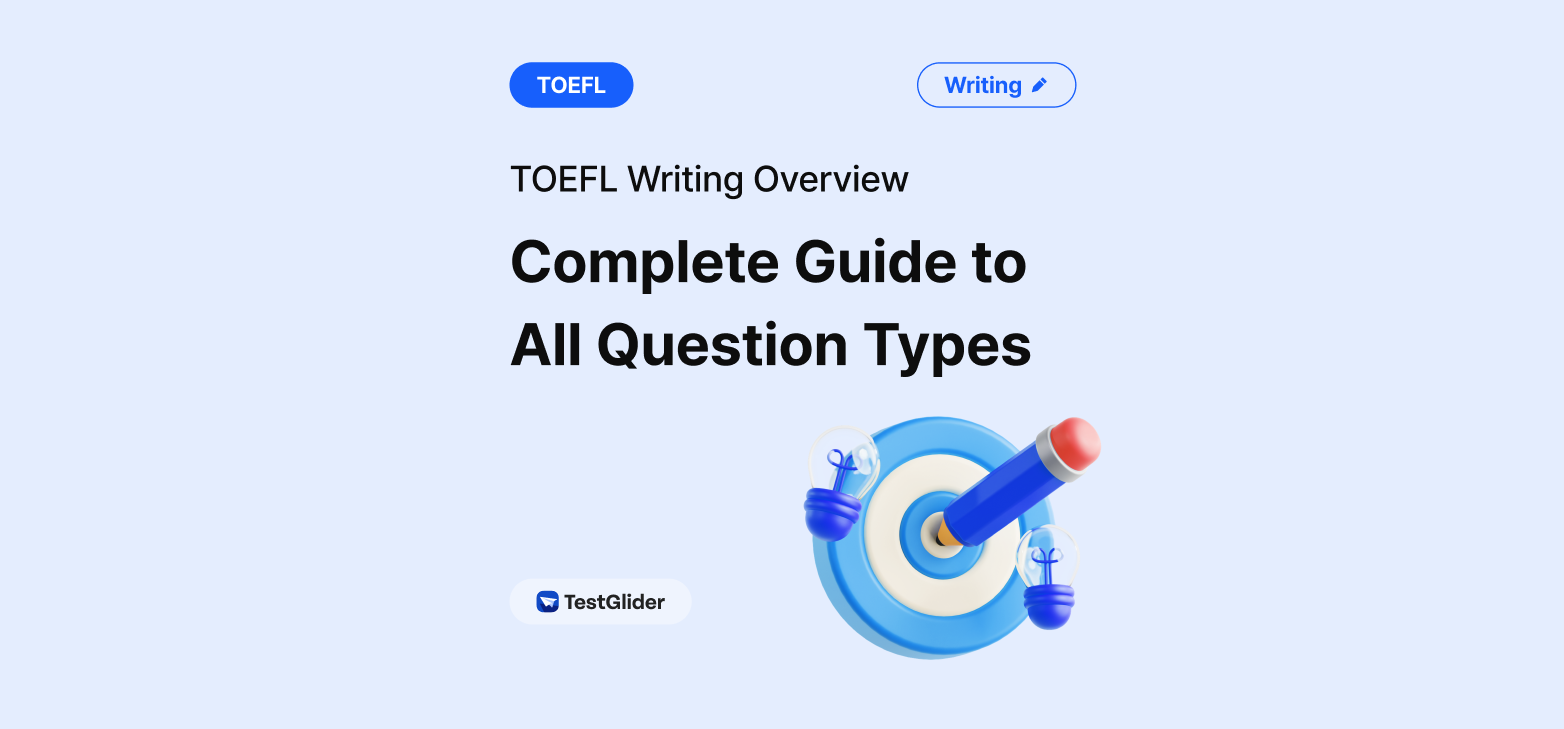Overview of the TOEFL Writing Section (post July 2023)
The TOEFL iBT Writing section has been carefully designed to assess your academic writing skills in English. Here’s what you need to know about the current format:
- The last section of the test (following Speaking)
- 2 writing tasks total
- Integrated Writing Task: 20 minutes
- Writing for an Academic Discussion Task: 10 minutes
- Total Writing section time: 30 minutes
- Score range: 0-30 points
- Typed responses on a computer
- Scored by both automated scoring and human raters
Two Task Types of the TOEFL Writing Section
Task Type 1 .Integrated Writing
What it tests :
Your ability to synthesize information from multiple(reading and listening) sources and present a coherent written summary
Task Details
It requires a test taker to:
- Read a short academic passage
- Listen to a related lecture
- Write a 150-225 word essay
Task Structure
- 3 minutes for reading the passage (academic topic)
- 2-3 minutes for related lecture
- 20 minutes for writing an essay
Relationships between the reading passage and the lecture
The task usually asks you to summarize the points given in the lecture and demonstrate how they relate to the certain points from the reading passage. Therefore, it is important to identify the relationship between the reading passage and the lecture.
- Argument-Counterargument : This is the most frequent relationship between the reading passage and the lecture. Two have different perspectives about one topic.
- Problem-Solution / Solution-Problem : This is not a very frequent relationship between the reading passage and the lecture, but you need to be prepared for it.
Whatever the relationship between the reading passage and the lecture is, test takers should be able to
- identify the key points from the reading passage and lecture
- summarize the passage and lecture without personal opinion
- demonstrate the relationship between the reading passage and lecture
Criteria
Your essay for the task is rated mainly based on the following criteria:
- Clarity in development: How effectively you select key information from the lecture and present it clearly, while relating it to the relevant details in the reading
- Organization: How well your ideas are organized into paragraphs in a logical, coherent manner
- The language use: How appropriate your word choice, grammar, vocabulary are
Task Type 2. Writing for an Academic Discussion
What it tests:
Your ability to identify the issue of a discussion, give a clear opinion supported by reasons and examples
Task Details
It requires a test taker to:
- Read a written discussion
- Write a 100-120 word response to a professor’s question
Task Structure
- Reading material: The professor’s question, two responses from different students
- 10 minutes for reading a discussion and writing an essay
Task Question Types
There are three detailed question types for the task. Whatever the question type is, you should contribute to the discussion in your own words.
- Agree/Disagree : You are asked to agree or disagree with a statement/opinion/stance/…
- Preference : You are asked to show your preference for a specific thing.
- Open-ended question : An open-ended question doesn’t have a clear stance, but you are still asked to state your opinion.
Criteria
Your essay for the task is rated mainly based on the following criteria:
- Relevant and clearly developed ideas
- Variety in the use of language
- A correct use of language
Tips for Success
Time Management
- Practice with a time limit every time
- Get used to read academic texts
- For both tasks, make plans for ideation, writing, and quick review
Develop Academic Writing Skills
- Read academic texts across various topics
- Expand academic vocabulary
- Learn academic essay structures and organization
- Work on grammar and sentence structure
- Get corrections on your essay
During the Test …
- Read directions and reading passages carefully
- Take notes when listening
- Plan before writing
- Make the best use of your template
Conclusion
Success in the TOEFL Writing section requires a combination of language proficiency, critical thinking skills, and strategic approach. Regular practice with authentic materials, focus on improving synthesis and argumentation skills, and familiarity with the task types will help you achieve a high score.
📚 Related Articles :
Looking to master other sections of the TOEFL? Check out our comprehensive guide: Complete Guide to TOEFL iBT Listening Question Types (2024 Update) →
🎯 Ready to Master TOEFL Reading?
Take TestGlider’s FREE TOEFL Practice Test and assess your current reading level. Join thousands of test-takers who’ve improved their scores through our comprehensive practice materials.

